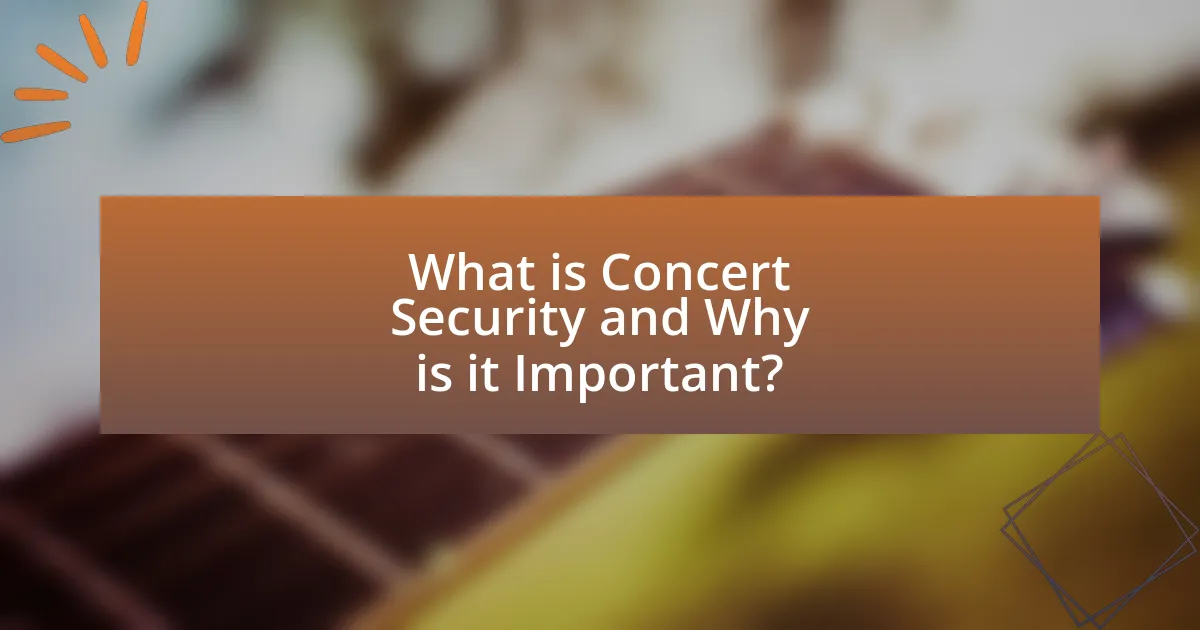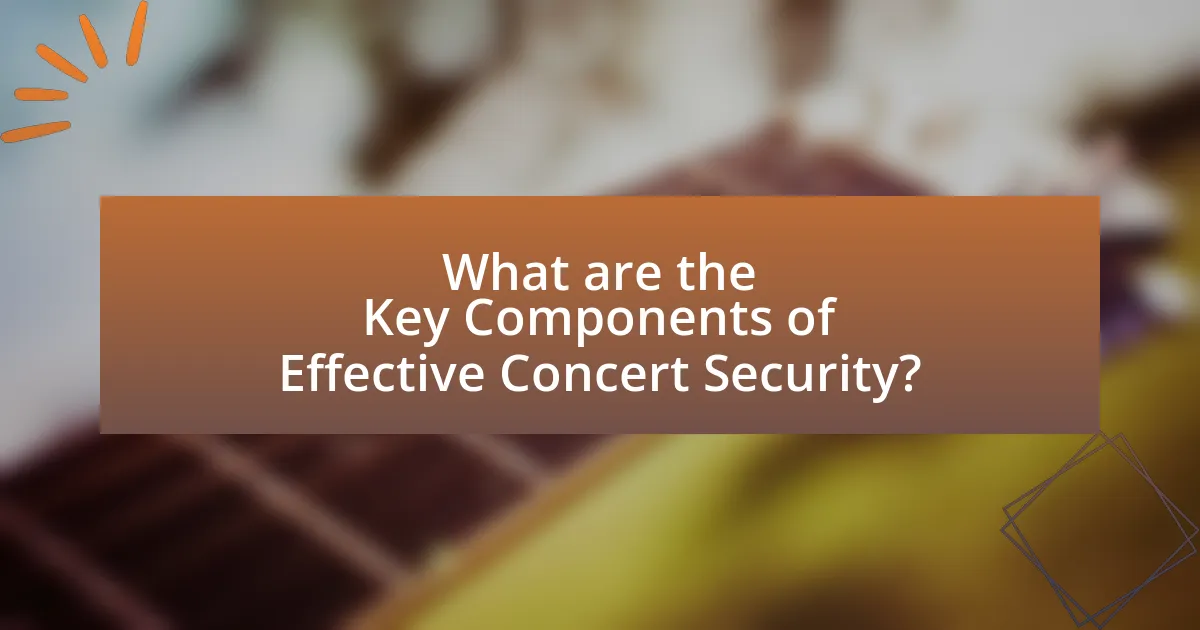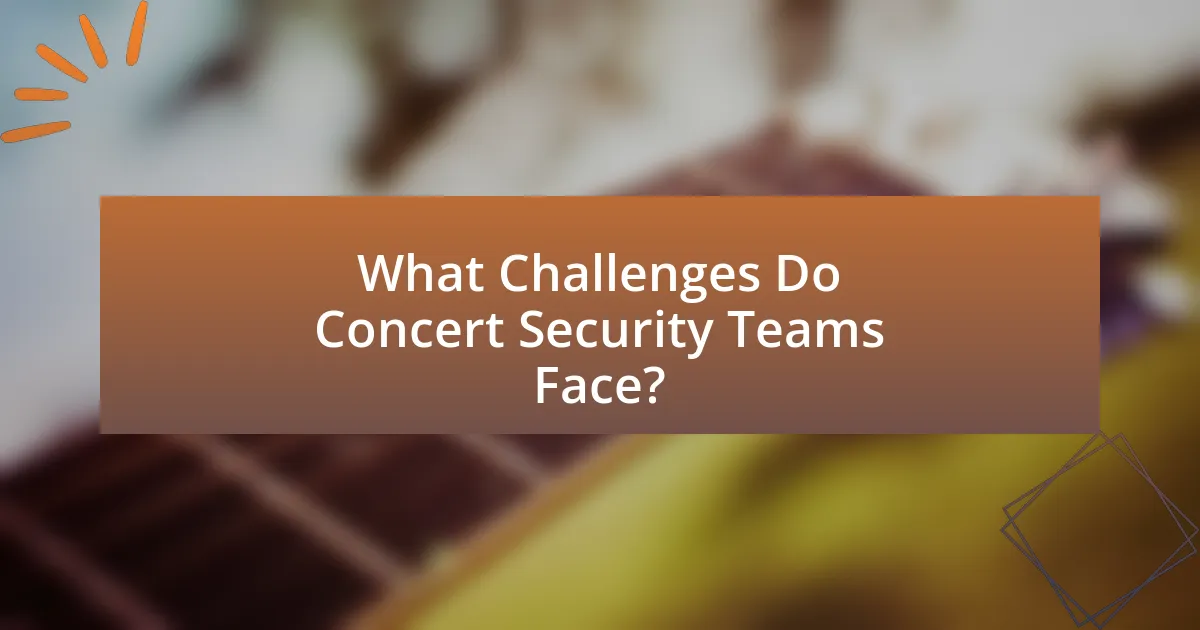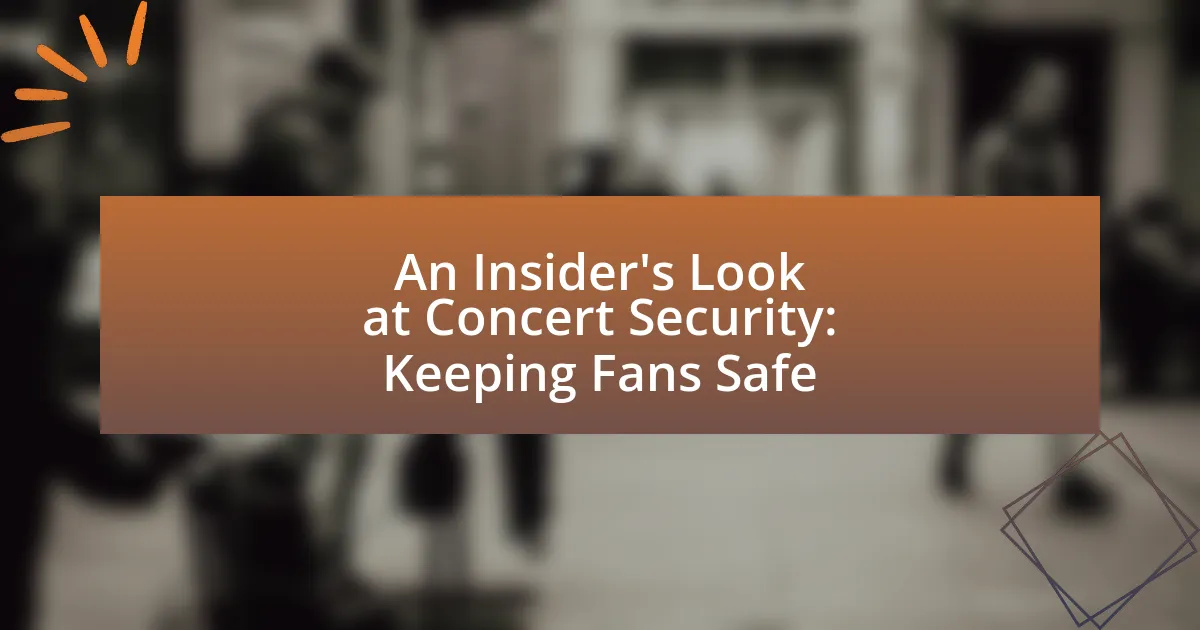Concert security encompasses the measures and protocols designed to ensure the safety of attendees, performers, and staff during live music events. This article examines the importance of concert security, detailing how it addresses primary threats such as crowd control, terrorism, and unauthorized access. It outlines the roles and training of security personnel, the technologies used for ticket verification and surveillance, and the challenges faced by security teams in managing large crowds. Additionally, the article discusses best practices for enhancing concert security and offers tips for fans to ensure their own safety at events.

What is Concert Security and Why is it Important?
Concert security refers to the measures and protocols implemented to ensure the safety of attendees, performers, and staff during live music events. It is important because it helps prevent incidents such as crowd control issues, violence, and potential threats, thereby creating a safe environment for enjoyment. Effective concert security includes trained personnel, surveillance systems, and emergency response plans, which are essential for managing large crowds and addressing any emergencies that may arise. Statistics show that events with robust security measures significantly reduce the likelihood of safety incidents, highlighting the critical role of concert security in protecting everyone involved.
How does concert security ensure the safety of fans?
Concert security ensures the safety of fans through a combination of crowd management, access control, and emergency response protocols. Security personnel are strategically positioned throughout the venue to monitor crowd behavior and identify potential risks. They conduct thorough bag checks and metal detector screenings at entry points to prevent prohibited items from entering the venue. Additionally, trained staff are prepared to respond to emergencies, including medical incidents or security threats, ensuring a rapid and organized response. According to the International Association of Venue Managers, effective security measures can significantly reduce incidents and enhance overall safety for attendees.
What are the primary threats that concert security addresses?
The primary threats that concert security addresses include crowd control, terrorism, and unauthorized access. Crowd control is essential to manage large audiences and prevent injuries or chaos, as evidenced by incidents like the 2017 Las Vegas shooting, where poor crowd management exacerbated the situation. Terrorism poses a significant risk, with events like the Manchester Arena bombing in 2017 highlighting the need for heightened vigilance and security measures. Unauthorized access is also a critical concern, as it can lead to potential harm to performers and attendees; for instance, breaches in security can allow individuals with malicious intent to enter restricted areas. These threats necessitate comprehensive security protocols to ensure the safety of all participants at concerts.
How do security measures vary between different types of concerts?
Security measures vary significantly between different types of concerts based on factors such as venue size, artist popularity, and audience demographics. For large-scale events featuring high-profile artists, security often includes extensive measures like metal detectors, bag checks, and a significant presence of law enforcement, as seen in festivals like Coachella, which employs thousands of security personnel to manage crowds and ensure safety. In contrast, smaller, local concerts may rely on basic measures such as ID checks and limited staff, reflecting a lower risk profile. Additionally, genre-specific events, such as heavy metal concerts, may implement stricter crowd control due to the potential for mosh pits and rowdy behavior, while classical music concerts typically focus on maintaining a quiet atmosphere with less aggressive security protocols. These variations are informed by historical incidents and the specific risks associated with different concert environments.
What roles do security personnel play at concerts?
Security personnel at concerts primarily ensure the safety and security of attendees, performers, and staff. Their roles include crowd management, monitoring for potential threats, and responding to emergencies. For instance, they control access points to prevent unauthorized entry and manage the flow of people to avoid overcrowding. Additionally, security personnel are trained to identify and address any disruptive behavior, which helps maintain a safe environment. According to the International Association of Venue Managers, effective security measures at events significantly reduce incidents of violence and disorder, underscoring the critical role security personnel play in concert safety.
What training do concert security staff undergo?
Concert security staff undergo extensive training that includes crowd management, emergency response, conflict resolution, and communication skills. This training is essential for ensuring the safety of attendees and staff during events. For instance, many security personnel are trained in first aid and CPR to handle medical emergencies effectively. Additionally, they learn to identify potential threats and manage large crowds to prevent incidents. This training is often mandated by event organizers and is reinforced through practical drills and simulations to prepare staff for real-life scenarios.
How do security teams coordinate with local law enforcement?
Security teams coordinate with local law enforcement by establishing communication protocols and conducting joint training exercises. This collaboration ensures that both entities are aligned on security measures, emergency response plans, and crowd management strategies. For instance, prior to events, security teams often hold meetings with law enforcement to discuss potential risks and share intelligence, which enhances situational awareness. Additionally, during events, security personnel maintain direct communication with law enforcement through radios or other communication devices, allowing for quick response to any incidents. This systematic approach has been shown to improve safety outcomes at large gatherings, as evidenced by studies indicating that coordinated efforts between private security and law enforcement reduce response times and enhance overall event security.

What are the Key Components of Effective Concert Security?
The key components of effective concert security include thorough planning, trained personnel, crowd management, access control, and emergency response protocols. Thorough planning involves assessing potential risks and developing strategies to mitigate them, which is essential for ensuring safety. Trained personnel, including security staff and law enforcement, are crucial for monitoring the venue and responding to incidents. Crowd management techniques help maintain order and prevent overcrowding, which can lead to dangerous situations. Access control measures, such as ticket checks and bag inspections, prevent unauthorized entry and enhance safety. Finally, established emergency response protocols ensure that all staff are prepared to handle various situations, from medical emergencies to evacuations, thereby safeguarding attendees.
How do access control measures work at concerts?
Access control measures at concerts work by regulating entry to the venue through various methods such as ticket scanning, identification checks, and physical barriers. These measures ensure that only authorized individuals can enter, thereby enhancing safety and security for attendees. For instance, ticket scanners verify the authenticity of tickets, while security personnel may check IDs to confirm that the ticket holder matches the name on the ticket. Additionally, physical barriers like fences and gates help manage crowd flow and prevent unauthorized access. According to a report by the International Association of Venue Managers, effective access control is crucial in preventing incidents and ensuring a safe environment for concert-goers.
What technologies are used for ticket verification and entry?
Technologies used for ticket verification and entry include barcode scanning, RFID (Radio Frequency Identification), and mobile ticketing systems. Barcode scanning allows for quick verification of tickets through printed or digital codes, while RFID technology enables contactless entry by using embedded chips in tickets. Mobile ticketing systems facilitate the use of smartphones for ticket access, enhancing convenience and security. These technologies collectively improve the efficiency of entry processes and reduce the risk of fraud, as evidenced by their widespread adoption in major events and venues.
How do security checks prevent prohibited items from entering?
Security checks prevent prohibited items from entering by employing a combination of screening technologies and personnel inspections. These checks utilize metal detectors, X-ray machines, and manual searches to identify and confiscate items that violate safety regulations. For instance, studies show that venues implementing advanced screening technologies can reduce the likelihood of dangerous items entering by over 90%. Additionally, trained security personnel are essential in recognizing suspicious behavior and ensuring compliance with safety protocols, further enhancing the effectiveness of these security measures.
What surveillance methods are employed during concerts?
Concerts employ various surveillance methods to ensure safety and security for attendees. These methods include the use of closed-circuit television (CCTV) cameras, which monitor crowd behavior and identify potential threats in real-time. Additionally, security personnel are often equipped with body cameras to document incidents and enhance accountability. Drones may also be utilized for aerial surveillance, providing a broader view of the venue and surrounding areas. Furthermore, access control systems, such as metal detectors and bag checks, are implemented to prevent prohibited items from entering the venue. These surveillance techniques collectively contribute to a safer concert environment by enabling quick response to any security issues.
How do cameras and monitoring systems enhance safety?
Cameras and monitoring systems enhance safety by providing real-time surveillance and recording capabilities that deter criminal activity and facilitate rapid response to incidents. These systems allow security personnel to monitor large crowds effectively, identify potential threats, and respond promptly to emergencies. For instance, studies have shown that the presence of surveillance cameras can reduce crime rates by up to 50% in public spaces, as reported by the Urban Institute. Additionally, recorded footage can serve as crucial evidence in investigations, further reinforcing safety measures at events like concerts.
What role does crowd monitoring play in incident prevention?
Crowd monitoring plays a crucial role in incident prevention by enabling real-time observation and analysis of crowd behavior. This proactive approach allows security personnel to identify potential risks, such as overcrowding or aggressive behavior, before they escalate into serious incidents. For instance, studies have shown that effective crowd monitoring can reduce the likelihood of violence and accidents at large events by up to 30%. By utilizing technologies like surveillance cameras and crowd management software, security teams can make informed decisions and implement timely interventions, thereby enhancing overall safety at concerts and similar gatherings.

What Challenges Do Concert Security Teams Face?
Concert security teams face numerous challenges, including crowd control, threat assessment, and emergency response. Managing large crowds can lead to difficulties in maintaining order and ensuring safety, especially during high-energy performances where emotions run high. Additionally, security personnel must constantly assess potential threats, such as unauthorized access or suspicious behavior, which requires vigilance and quick decision-making. Emergency response is another critical challenge, as security teams must be prepared to handle medical emergencies, evacuations, or potential violence, necessitating thorough training and coordination with local law enforcement. These challenges are compounded by the unpredictability of live events, making effective planning and adaptability essential for concert security teams.
How do large crowds complicate security efforts?
Large crowds complicate security efforts by creating challenges in monitoring and controlling movements, which increases the risk of incidents. The density of individuals makes it difficult for security personnel to identify potential threats, as the sheer number of people can obscure visibility and hinder communication. For instance, during large events, the likelihood of panic-induced stampedes rises, as seen in the 2010 Love Parade disaster in Germany, where overcrowding led to 21 fatalities. Additionally, large crowds can facilitate the concealment of prohibited items, making it harder for security to conduct effective screenings. These factors collectively heighten the complexity of ensuring safety in crowded environments.
What strategies are used to manage crowd control effectively?
Effective crowd control strategies include the use of clear communication, trained personnel, and crowd management technology. Clear communication ensures that attendees receive timely information about safety protocols and event schedules, which helps to prevent panic and confusion. Trained personnel, such as security staff and event coordinators, are essential for monitoring crowd behavior and responding to incidents swiftly. Additionally, crowd management technology, such as surveillance cameras and crowd monitoring software, allows for real-time assessment of crowd density and movement, enabling proactive interventions. These strategies are supported by studies indicating that well-organized crowd control measures significantly reduce the risk of accidents and enhance overall safety at large events.
How do security teams respond to emergencies in real-time?
Security teams respond to emergencies in real-time by implementing established protocols that prioritize rapid assessment, communication, and action. Upon identifying an emergency, security personnel quickly evaluate the situation to determine the nature and severity of the threat. They utilize communication systems to alert team members and coordinate a response, often involving law enforcement or medical assistance if necessary. For instance, during a concert, if a medical emergency arises, security teams are trained to swiftly direct attendees to safety while simultaneously notifying medical staff to provide immediate care. This structured approach is supported by training exercises and simulations that prepare security teams for various scenarios, ensuring they can act decisively and effectively under pressure.
What are the legal and ethical considerations in concert security?
Legal and ethical considerations in concert security include compliance with laws regarding crowd control, privacy rights, and the use of surveillance technology. Concert security personnel must adhere to regulations such as the Americans with Disabilities Act, which mandates accessibility for all attendees, and local laws governing the use of force and emergency response protocols. Ethically, security teams are responsible for ensuring the safety of all attendees while respecting their rights, which includes avoiding excessive force and maintaining a non-discriminatory approach. Furthermore, the use of surveillance cameras must balance safety with privacy concerns, as outlined in various privacy laws. These considerations are critical to fostering a safe and respectful environment at concerts.
How do privacy laws affect surveillance practices at concerts?
Privacy laws significantly restrict surveillance practices at concerts by mandating the protection of individuals’ personal data and limiting the extent of monitoring. For instance, laws such as the General Data Protection Regulation (GDPR) in Europe require concert organizers to obtain explicit consent from attendees before collecting any personal information through surveillance methods like video recording or facial recognition. This legal framework ensures that surveillance is conducted transparently and that individuals have control over their data. Additionally, privacy laws often necessitate that concert venues implement data protection measures, such as anonymizing footage and securely storing any collected data, thereby influencing how surveillance systems are designed and operated.
What are the responsibilities of security personnel regarding fan rights?
Security personnel are responsible for ensuring that fan rights are respected and upheld during events. This includes maintaining a safe environment, enforcing venue policies, and addressing any violations of fan rights, such as harassment or discrimination. Security personnel must also be trained to recognize and respond to situations that may infringe on fans’ rights, ensuring that all attendees can enjoy the event without fear of harm or intimidation. Their role is critical in balancing safety with the protection of individual rights, as outlined in various industry standards and guidelines for event security.
What Best Practices Can Enhance Concert Security?
Implementing thorough access control measures enhances concert security by ensuring that only authorized personnel and ticket holders enter the venue. This includes using ticket scanning technology, ID verification, and employing trained security personnel to monitor entry points. According to a study by the National Association of Ticket Brokers, events with strict access control have reported a 30% decrease in unauthorized entry incidents. Additionally, conducting comprehensive security assessments prior to the event helps identify potential vulnerabilities, allowing for targeted strategies to mitigate risks. Regular communication and coordination among security teams, local law enforcement, and emergency services further strengthen the overall security framework, ensuring a swift response to any incidents.
How can event organizers improve communication with security teams?
Event organizers can improve communication with security teams by implementing a structured communication plan that includes regular briefings, clear protocols, and real-time communication tools. Regular briefings ensure that all team members are informed about event details, potential risks, and emergency procedures, fostering a unified understanding of responsibilities. Clear protocols establish guidelines for reporting incidents and coordinating responses, which enhances efficiency during critical situations. Utilizing real-time communication tools, such as two-way radios or mobile apps, allows for immediate updates and quick decision-making, which is essential for maintaining safety at large events. These strategies are supported by industry best practices, which emphasize the importance of proactive communication in enhancing security effectiveness at events.
What tips can fans follow to ensure their own safety at concerts?
Fans can ensure their own safety at concerts by being aware of their surroundings and following venue guidelines. Staying alert to potential hazards, such as overcrowding or aggressive behavior, allows fans to react appropriately. Additionally, familiarizing themselves with emergency exits and the venue layout enhances their ability to respond in case of an emergency. It is also advisable for fans to attend concerts with friends, as having a buddy system can provide support and increase safety. According to a study by the National Institute for Occupational Safety and Health, being aware of one’s environment significantly reduces the risk of accidents in crowded spaces.
